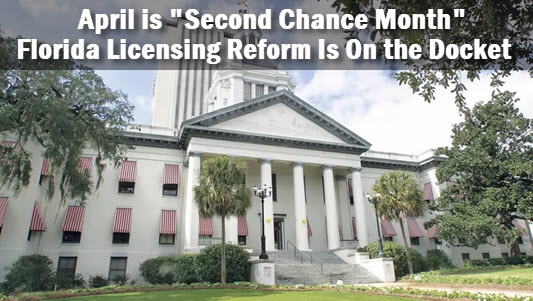Florida Policy Institute Renews Call for Occupational Licensing Reform During ‘Second Chance Month’
Enacting common-sense reforms could have saved Florida millions in reincarceration costs in previous years.
April 25, 2023 12:05 pm

Photo via Florida Trust
| Columbia County Observer
graphic
ORLANDO, FL – The Sunshine State has hundreds of “collateral consequences” related to occupational licensing for people with past criminal convictions, which makes it difficult – if not impossible – for returning citizens to become barbers/hairdressers, cosmetologists, contractors, or enter numerous other professional fields.
President Biden has proclaimed April as “Second Chance Month.”
The nonpartisan Florida Policy Institute (FPI) renews its call for common-sense occupational licensing reforms, which could have yielded savings of $60.8 million to $152 million in reincarceration costs during FY 2020-21 and FY 2021-22, in addition to providing pathways to economic mobility for returning citizens.
REPORT:
A COMPLETED SENTENCE
ONGOING PUNISHMENT
How Past Criminal Convictions
Bar Floridians from Occupational
Licensing Opportunities
Reforms include reducing the required training hours for certain occupations, eliminating the "moral character" clause, which gives licensing boards broad discretionary power to disqualify applicants with criminal pasts based on their perceived moral character, and allowing for criminal records to be used as grounds for the denial of licensure only if the past conviction is directly related to the profession.
FPI also points to current legislation – HB 489 – that would reduce the period of time during which licensing boards could use a criminal record as grounds to deny an applicant.
Reforming the way Florida approaches occupational licensing would be a win-win situation. Floridians trying to rejoin their communities following incarceration would have better access to job opportunities and economic mobility, while state and local economies would enjoy a boost.
"Many states have already heeded researchers' recommendations and enacted comprehensive policies that eliminate several harmful barriers to workforce development for returning citizens," said Tachana Joseph-Marc, senior policy analyst at FPI and author of the analysis. "It is time for Florida to follow suit. Reforming occupational licensing would help reduce recidivism and alleviate the state Department of Corrections' budgetary constraints."
Last month, FPI and the DeVoe L. Moore Center released a report, A Completed Sentence, But Ongoing Punishement, that examined how expanding occupational licensing opportunities for people with criminal records would result in fiscal benefits to the state.
Florida has the fifth most burdensome occupational licensing requirements in the nation. This means that the state has, on average, more mandated hours of training, fees, and a greater share of regulated occupations.
---
Sadaf Knight has over 13 years of experience in public policy research, advocacy and nonprofit management. She is CEO of Florida Policy Institute
Florida Policy Institute is an
independent, nonpartisan and nonprofit
organization dedicated to advancing state
policies and budgets that improve the
economic mobility and quality of life for
all Floridians.

 By
Sadaf Knight
By
Sadaf Knight